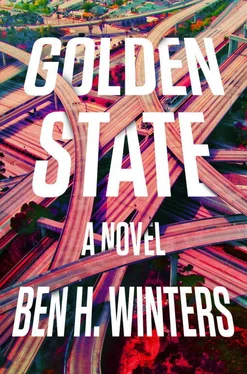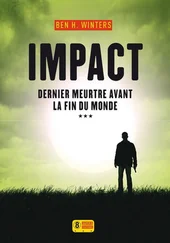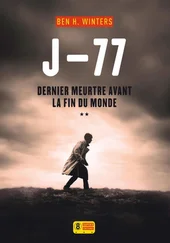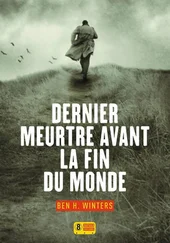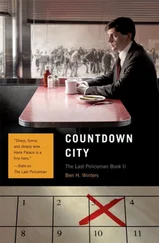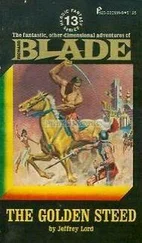Now, very slowly, he pulls out his own gun and aims it at me, as I am aiming mine at him.
The cold air of the basement is perfectly still.
“I doctored all of those stretches,” says Arlo. “I put a forgery on the Record. I convinced two people, two that you know of, to sacrifice their lives, knowing that it was worth it. What makes you think I couldn’t create a hologram of myself, and it’s the hologram you are talking to now?”
“No,” I tell him. “Yes. I don’t—I don’t know.”
“So if I’m telling the truth, then you can shoot me.”
“What?”
“I’m not here.” He takes a step closer. His gun is pointed at my face. “It’s not me. So shoot. Go on. Shoot—”
I pull the trigger and I feel the kick of discharge, and Arlo’s chest explodes in a red blur and he flies backward and slams into the stair rail. I run to him, and I don’t know if I’m crying because he is my friend, my oldest friend and I love him and he is dying in my arms, or because of what has happened. He is cradled in my arms, his real body, no hologram, the real Arlo, his real flesh body. Then I hear footsteps crashing down toward us, the whole staircase is shuddering with the force, and now it all makes itself clear to me in retrospect, every inch of this nightmare playing itself out in reverse and filling in its details, right up to this moment— this moment right now! He never stopped playing mastermind, arranging details, right up until this moment, with the regular police pouring off the stairs and him bleeding in my arms—
“Freeze,” they are shouting. “Do not move!”
Captain Elena Tester and six other officers, a small army of regular police filling up the narrow space around the stairs, surrounding us with guns drawn.
“Wait,” I say, turning, body hot with confusion and fear. “Wait.”
Tester and her officers crowd around me, closing in. She is staring, astonished; Arlo is collapsed in my arms, sprawled across my lap.
“Laszlo,” she says. “What have you done? ”
“Nothing. I haven’t done anything. It was… He…”
They step closer, one step at a time, guns raised. Arlo, in my arms, bends his body upward slowly. Cranes his lips up to my ear and says, “Worth it.”
Tester circles me warily, keeping the gun leveled at my face, and the other officers fan out behind her. Arlo is cradled in my lap, his blood on my pants, his blood on my arms and on my face, his blood is smeared all over my black coat. What am I going to say? He tricked me. He said he wasn’t real. He said that shooting him wasn’t shooting a real person.
I feel that there is nothing I can do but explain myself, and that I would be a fool at the very least not to try. So I tell Captain Tester she’s making a mistake.
I tell her that Arlo Vasouvian rigged the whole thing, that he is trying to frame the Speculative Service, that he is purposefully attempting to erode the trust in our Basic Laws, to bring the State crashing in, that he has cooked up an elaborate scheme to kick away the pillars that have supported society, to smash in the walls that have kept us safe inside the Objectively So. While Arlo’s body lies in my arms and Tester’s officers keep their guns trained on my face, I say, “You have to believe me, you have to believe me”—I say all the things that are the only things I can say, and she reacts exactly as I would have predicted.
“You know, Laszlo,” she says flatly, “that sounds like the wildest bunch of lies that I have ever heard. But you tell me .” She crouches beside me, pulls out her handcuffs. “You’re the expert.”
“Look. Look!” Shenk had him by the arm at this point, had him in his clutches, and he wasn’t letting go. “If this kid thinks that he’s an alien from outer space, and he does things based on this belief? That he’s an alien? Then, I mean, on a certain level, guess what? The kid’s a fucking alien.”
—Benjamin Wish,
The Prisoner
Hey! I think. As loud as a thought can get, which after all is not all that fucking loud. I’m in here. Hey! I can’t see out the windows of the truck because the windows are blacked out, tinted over, so I do what I can do, which is stare into them and beam my thoughts out uselessly into the passing world as the truck rumbles along: Help.
I’m in here.
Help!
No one can hear. No one can help. The people out there are dim shapes on the street corners. Faceless creatures behind the wheels of their vehicles, glancing with disinterest at the truck and then away.
I am strapped to my seat. A metal pole runs from floor to ceiling in front of me, and I am shackled to it at wrist and ankle.
The truck has been stripped of the artifacts of its old design. All that’s telling me where I am is the old stink of cooking water and the shape of the vehicle, tubular, low and long. I am inside a truck that is shaped like a hot dog, and I am both inside this machine, shackled to a plastic bench by my wrists and ankles, and outside it, looking longingly at it as it cruises past. I could not have known, the many times I looked with longing at the Dirty Dog cruising the city, that it is out of service. It has been decommissioned and repurposed as a mobile prison, delivering the exiled to their exile.
No wonder, I think stupidly. No wonder it never stops .
Even in the state of dull bafflement with which I have suffered the last two weeks, of trial and sentence, of confusion and fear, of public approbation and private pain, even in my raw confused condition, I can pick up the old scents of boiled meat, of relish and mustard and pickle. I take some very small comfort in the pleasant ancient smells of condiments and meat. And I take comfort, too, in the thought of all the people out there, my good and golden fellow citizens, watching the black truck with the pink piping as it sharks past, wondering idly as I have for years, How come it never stops?
I can see where the refrigerator once was, up there behind the captain’s-chair-style driver’s seat. I can see where they had a row of compact metal containers for the various condiments, and probably a steam tray for the hot dogs themselves. But now all of these culinary accessories have been replaced by monitor screens, a bank of dials, a map of the city covered in beeping lights and lines.
One of these dots, it is easy to understand, is us. This vehicle I’m captive inside of. That is easy to figure. Requires zero speculation. We are moving fast now, and the dot is moving fast.
It’s just me in the truck—me and the driver, me and the driver and the man seated across from me, a narrow man in a tan coat and sunglasses, with a gun in his lap. The gun and the man are both staring at my face.
Help, I think, sending out my invisible distress call to the people we’re driving past, the other cars and pedestrians we’re presumably passing. Help!
“Excuse me?” I say to the man, but he doesn’t answer. He looks like a Librarian, except for the sunglasses. He has the same set expression in his bearing, in his posture. Passive, still, radiant with authority.
I am forced into a hunched position by the way I’ve been bound, tied to the pole with a set of sleek plastic tethers. I have not been changed into any sort of jumpsuit, nor even stripped of my Speculator blacks. Only my pinhole has been taken from me. Otherwise I am still me. There is heat on the back of my neck.
I feel miserable, a result of how much I now understand that I never did before, how much I’ve learned in these last days and how much dissonance I’m suffering now; or it might just be because the air inside the decommissioned hot dog truck is stale and close and pungent. It’s hot, and where I’m going it’s only getting hotter.
Читать дальше
